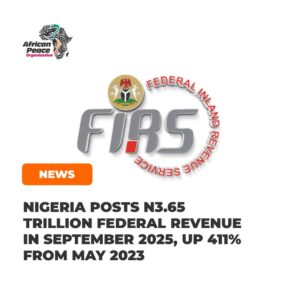Nigeria Posts N3.65 Trillion Federal Revenue in September 2025, up 411% from May 2023
FIRS credits bold fiscal reforms, non-oil growth, and compliance improvements for record surge, even as borrowing remains part of fiscal strategy.
Nigeria’s federal revenue surged to N3.65 trillion in September 2025, a leap of 411 percent over the N711 billion recorded in May 2023, when the current administration assumed office, the Federal Inland Revenue Service (FIRS) announced in Abuja.
Dr. Zacch Adedeji, Executive Chairman of the FIRS, made the disclosure while briefing State House correspondents.
He attributed the remarkable growth to sweeping fiscal reforms, tighter compliance mechanisms, and a shift in Nigeria’s revenue mix toward non-oil sources.
Adedeji said non-oil collections experienced the most striking gains, rising from about N151 billion in May 2023 to over N1.06 trillion by September 2025.
Oil revenue also climbed, from roughly N96 billion to N644 billion during the same period. Value Added Tax (VAT) collections more than tripled, reaching N723 billion (from N218 billion), while customs and upstream petroleum revenues also posted strong increases.
Despite the surge, Adedeji defended the continued use of borrowing in government financing.
He argued that borrowing is a legitimate and necessary component of the nation’s budget framework particularly when directed at long-term infrastructure and development projects.
He clarified that borrowing was confined to what the National Assembly had approved, and that it should support the “matching concept” whereby long-term projects are financed over time.
Between January and August 2025, FIRS collected N20.62 trillion in tax revenues, representing a 40.8 percent increase compared to the same period in 2024, surpassing its baseline target of 16.4 percent. Adedeji noted that non-oil revenues constituted much of this growth.
To sustain momentum, the FIRS chair disclosed that a new regime of Personal and Company Income Tax reforms is slated to begin in January 2026, aimed at further broadening the tax base and reducing overreliance on borrowing.
He also said the agency is developing a presumptive tax framework for hard-to-tax sectors and working to harmonize subnational levies.
Observers say the revenue jump could bolster Nigeria’s fiscal capacity and reduce dependence on external financing.
However, critics caution that sustainment will depend on consistent policy execution, transparency in revenue management, and structural reforms to address institutional inefficiencies and leakages.
Source: Nairametrics





